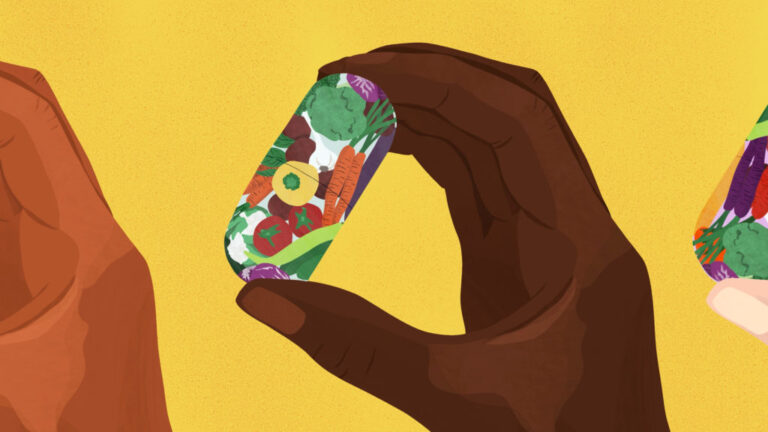Imagine a world in the not-so-distant future… You wake up and scan your Apple Watch for data on your sleep quality, gut microbiome, and blood sugar.
A notification appears: It’s breakfast time.
At your doorstep, a robot delivered a personalized meal kit, designed to meet your specific nutritional needs for the day. It’s fresh, nutritious and ready in minutes.
Do you think this seems unrealistic? Think again. Personalized nutrition could soon be on your plate.
Over the past decade, personalization has swept nearly every consumer-facing industry.
- Spotify dominates music streaming with individualized music suggestions and personalized marketing.
- Netflix and Amazon have built their empires on carefully tailored recommendation algorithms.
- Shoe giants Nike and Vans have found success offering customizable shoes.
Consumers everywhere expect hyper-curated experiences and intimately designed products.
While the food industry has historically been a laggard, a growing number of companies now want to personalize what you eat.
What it is: Personalized nutrition goes beyond food. Based on various factors, such as a user’s genetic profile or microbiome, startups offer tailored nutritional advice or create personalized supplements to meet your unique needs.
Emerging nutrition technologies include devices like wearables and fitness trackers, services like at-home DNA testing and stool testing kits, and even personalized meal delivery services.
A difficult problem to solve. Nutrition science, however, has had its difficulties. A metaphorical list of confounding variables, ranging from epigenetics to age to lifestyle factors, makes effects difficult to isolate:
- Almost 40% peer-reviewed diet research turns out to be wrong.
- Nutrition science is significantly underfunded, with only $88 million of the annual federal budget (<7%) dedicated to nutrition research.
Digging deeper, researchers discover that the principle of a one-size-fits-all diet may be fundamentally flawed.
In 2015, a landmark study on nutrition, discovered that reactions to food are very individual: different people can have completely different reactions to the same meal. Even the same food eaten by the same person can be healthy or unhealthy depending on the time of day or amount of sleep.
As scientists uncover the massive impact of diet on well-being, it’s no surprise that decades of widespread dietary advice, willpower-driven diets, and predatory weight-loss companies have left our health in ruins.
Last year, obesity and hypertension collectively cost the United States $200 billion. Meanwhile, a regular diet of processed foods and refined fats/sugars leads to an increase in life-threatening food allergies.
Thanks to increased demand and better technology, nutrition science may be on the verge of a renaissance.
- Since 2014, mentions of “personalized nutrition” in the news have increased significantly.
- The pandemic has increased interest in nutrition tailored to factors such as immunity and mood, with 64% of consumers considering it a top priority.
Eager to get started, startups exploit everything, from DNA stool samples to determine how our bodies react to food.
- Genomics: DNA testing giant 23andMe, which offers personalized nutritional information, went public via SPAC last June. Analysts predict that the genomics data scene is just starting to heat up; the industry is expected to make $7.4 billion this year.
- Microbial: Microbiome testing, a hot topic in nutrition lately, had a big year: Seed Health ($40 million), DayTwo ($37 million) and ZOE ($20 million) all conducted tests. lucrative financing rounds.
- Metabolic: Continuous glucose monitors from companies like Levels, NutriSense, and January AI help provide real-time insights into the body’s metabolic reactions.
- Other: Elo Health uses blood tests to provide accurate nutritional recommendations. The Everlywell Home Test Kit ($75 million) helps users identify food sensitivities and allergies.
Meanwhile, meals prepared for you add yet another layer of convenience. Daily Harvest has benefited from increased attention during the COVID-19 pandemic, while Trifecta just closed a $20 million Series B.
Although nutrition startups are attracting investor interest, the current market is relatively small. Expert project $64 billion sales over the following decades, but in 2019 the global market was just short of $2.5 billion.
For now, it’s unclear whether improving technology will make a difference: scientists have been trying to understand nutrition for decades, to no avail.
Additionally, critics of the movement believe that nutrition is more art than science and that accurate nutrition is simply an unattainable goal. Brita Rosenheim, partner at Culterra Capital and Better Food Ventures, sees a disconnect:
“Standardized human behavior, especially when it comes to food, is simply not accurate. »
This is not to say that personalized nutrition is a pipe dream.
BCG consulting firm predicted that the companies most likely to succeed will be those that are able to build a complete ecosystem, combining the different stages of the nutrition process, from data to diagnostics to delivery. And many companies put the pieces together:
2019: Viome acquired Habit. Kraft Heinz acquired Wellio. Mars Edge has acquired Foodspring.
2020: Bayer has taken the majority stake in Care/of.
2021: Unilever has acquired Onnit. Nature’s Way acquired Baze/ Seed Health acquired Auggi. Elo Health has partnered with 19Labs.
The Nestlé shopping trip. Leading the pack, Nestlé has spent considerable sums to build capacity across all stages of the nutrition value chain.
- In 2017, Nestlé spent $2.3 billion on Atrium Innovations (owner of supplement makers Pure Encapsulations, Garden of Life and Douglas Laboratories).
- Last year, the company acquired personalized vitamin company Persona, medical nutrition startup ZENPEP, collagen maker Vital Proteins and meal delivery startup Freshly.
- Last April, Nestlé decided to acquire several nutritional supplement brands from The Bountiful Company for $5.75 billion.
By playing for the long term, Nestlé’s bets seem to be paying off. Its portfolio grew 12.2% year-over-year, with sales exceeding $3.7 billion in 2020.
Take away: Personalized nutrition has enormous potential, even though the sector is relatively immature. Over the next few decades, agile startups may no longer be at the forefront in this space, especially as traditional grocery giants reveal their appetite, exploiting their war chests and attracting emerging innovators.
